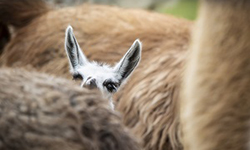Baby llama wins research openness award
Friday, 13 December 2019

It was the defining poll of the year, as the country decided between Boris and Jeremy. Not yesterday’s general election… but the naming of a baby llama born in the University of Reading’s farm herd.
Now the campaign has won Reading an Openness Award from Understanding Animal Research. UAR oversees the Concordat on Openness on Animal Research, of which Reading is a signatory.
The week-long campaign in July 2019 was used to highlight Reading’s animal research statistics, the University’s approach towards openness on animal research, and case studies of how animal research is helping to develop new therapies for people.
It included a public poll on social media, a video highlighting the role of llamas in drug discovery, and a series of infographics.
Ross Millard, who presented the award at a ceremony in London last week, said that judges had been impressed with the ‘innovative’ campaign.
“Thanks to well-made infographics, this media campaign was clear, engaging, and the data was not sanitised,” he said.
“This was a brave piece of work that reached a lot of people. It’s not every day that a Concordat signatory can co-ordinate an animal statistics campaign around the arrival of a cute baby llama, but this university seized the opportunity perfectly.”
Reading’s winning entry beat strong competition in the ‘website or use of new media’ category from the University of Cambridge and a joint project from the Universities of Oxford, Cambridge and Edinburgh, Francis Crick Institute and Wellcome.
University Secretary, Dr Richard Messer, is chair of Reading’s Animal Welfare and Ethical Review Body, a panel of expert scientists and independent lay people that oversees the appropriate use of animals in research at the University. Over several years, the group led Reading’s push towards greater openness with the wider public about animal research.
Dr Messer said: “We are delighted to win an Openness Award. Our llama campaign was fun, but the science that it highlighted is serious. It is right to show the public what we do, and why.”
Professor Gary Stephens is the licence holder for the research project using llama ‘nanobodies’ to help develop new drugs at research institutes around the UK.
Prof Stephens said: “Nanobody technology is one of the most exciting new developments in medical research, and we’re pleased that the University of Reading is bringing its combined expertise in pharmacy research and animal husbandry to keep llamas for this purpose.
“We want to see a future where no animals are used in scientific studies, but at the moment, a responsible use of animals is still vital for discoveries and research that saves lives.”
And the baby llama? He was named Jeremy, after a landslide victory.
